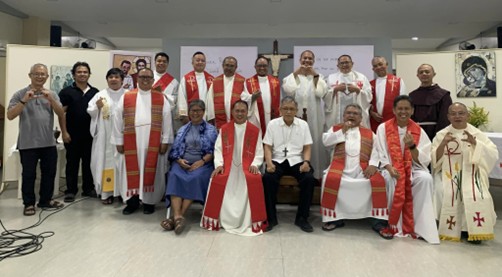Author Archives: Fraternidad Iesus Caritas
(Español) Horeb Ekumene, 374, noviembre 2024
Fernando Enrique RAMÓN CASAS, new bishop
Today, November 6, 2024, Pope Francis has appointed our brother Fernando Enrique as auxiliary bishop of Valencia. Great joy for everyone in the midst of pain and tragedy in that land marked by the DANA disaster. It is good news despite the suffering of so many people that has motivated the solidarity of the entire country.
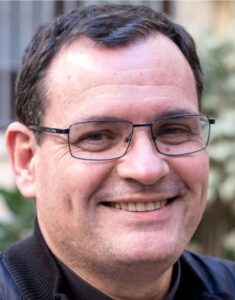 Fernando is 58 years old. Rector of the Major Seminary of Valencia for 13 years and two more as a trainer, since last September, he is the episcopal vicar of the V Vicariate of Valencia, ‘Llíria-Requena-Ademuz’. In addition, he is a professor of Sacred Scripture at the San Vicente Ferrer Faculty of Theology, and director of the Academy of Biblical and Oriental Languages. Before that, he was at the Pontifical John Paul II Institute, and a canon of the Cathedral. He was born in Valencia, although he has always lived in the town of Xirivella (in the Huerta Sur region, in the metropolitan area of Valencia city). He entered the La Inmaculada Major Seminary in 1988, where he developed all his training: two years of philosophy in Moncada and Theology and Pastoral in Valencia.
Fernando is 58 years old. Rector of the Major Seminary of Valencia for 13 years and two more as a trainer, since last September, he is the episcopal vicar of the V Vicariate of Valencia, ‘Llíria-Requena-Ademuz’. In addition, he is a professor of Sacred Scripture at the San Vicente Ferrer Faculty of Theology, and director of the Academy of Biblical and Oriental Languages. Before that, he was at the Pontifical John Paul II Institute, and a canon of the Cathedral. He was born in Valencia, although he has always lived in the town of Xirivella (in the Huerta Sur region, in the metropolitan area of Valencia city). He entered the La Inmaculada Major Seminary in 1988, where he developed all his training: two years of philosophy in Moncada and Theology and Pastoral in Valencia.
He has a degree in Religious Sciences from the San Vicente Ferrer Faculty of Theology in Valencia and completed his studies in Rome, where he graduated in Sacred Scripture from the Pontifical Biblical Institute and took doctoral courses at the Pontifical Gregorian University in Rome (1998-2005). Before that, he was a religion teacher in various schools and parish priest in various towns in Valencia and Alicante. He has 30 years of 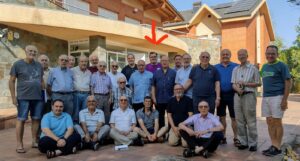 priestly ministry. During those years he was also chaplain of the Monastery of the Oblate Sisters of Christ the Priest. And he has been a counselor of the Cursillos de Cristiandad movement in Valencia and an animator of a Team of Our Lady.
priestly ministry. During those years he was also chaplain of the Monastery of the Oblate Sisters of Christ the Priest. And he has been a counselor of the Cursillos de Cristiandad movement in Valencia and an animator of a Team of Our Lady.
Fernando, congratulations and may you always have the smell of sheep and be at the side of the last. Your fraternity of Spain we wish you to be a good shepherd.
Lettter from Tagum. Eric LOZADA, international responsible
“I shall complete the journey… Do not be afraid. On the journey outward all will be well; on the journey back, all will be well; the road is safe.” Tobit 5,16
Dear Brothers:
Warm greetings from Tagum!!!
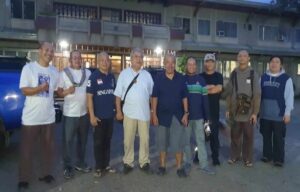 Travelling from several parts of the country, we are 17 brothers and a little sister gathered for our national assembly at Bishop Joseph Regan Spirituality Center, La Filipina, Tagum City, Philippines. The journey coming in was specifically challenging for our brothers from the prelature of Marawi who have travelled the whole day by land negotiating dangerous cliffs and roads under construction. Their presence, however was truly inspiring especially because after the 2017 siege, they continue to live as nomads, pitching their tents at the neighboring Iligan diocese and Marawi is still in shambles. Displaced but never disconcerted, they thrive in a climate of uncertainty made worse by political manipulation and religious extremism. The spirituality of Nazareth and fraternal solidarity both amongst themselves and with the people has sustained them. Their situation is ameliorated with the coming of some religious priests determined to do mission there. Together with their bishop, they come in full force. Little Sister Cecilia Grace helps us see the connection between the fraternity’s beginnings and Marawi. The late Bishop Benny Tudtud, then bishop of Marawi invited Little Sister Madeleine in the early 1970’s. Up until now, the prelature has been the nexus of Muslim-Christian dialogue in the Philippines. The presence of Jimmy, a newly ordained deacon is a seed of hope to the fraternity of aging and weakening membership.
Travelling from several parts of the country, we are 17 brothers and a little sister gathered for our national assembly at Bishop Joseph Regan Spirituality Center, La Filipina, Tagum City, Philippines. The journey coming in was specifically challenging for our brothers from the prelature of Marawi who have travelled the whole day by land negotiating dangerous cliffs and roads under construction. Their presence, however was truly inspiring especially because after the 2017 siege, they continue to live as nomads, pitching their tents at the neighboring Iligan diocese and Marawi is still in shambles. Displaced but never disconcerted, they thrive in a climate of uncertainty made worse by political manipulation and religious extremism. The spirituality of Nazareth and fraternal solidarity both amongst themselves and with the people has sustained them. Their situation is ameliorated with the coming of some religious priests determined to do mission there. Together with their bishop, they come in full force. Little Sister Cecilia Grace helps us see the connection between the fraternity’s beginnings and Marawi. The late Bishop Benny Tudtud, then bishop of Marawi invited Little Sister Madeleine in the early 1970’s. Up until now, the prelature has been the nexus of Muslim-Christian dialogue in the Philippines. The presence of Jimmy, a newly ordained deacon is a seed of hope to the fraternity of aging and weakening membership.
The beauty of the place
 Bishop Joseph Regan Center is managed by Ancillae Christi Regis (ACR) Sisters. This local congregation of sisters which was founded by the late Bishop Reagan in 1989, the first bishop of the diocese of Tagum owns this 2-hectared center, seated on a hill and a meadow with newly built facilities which could accommodate close to a hundred retreatants. The beauty of the scenic view from its veranda is equaled by the routine exercise of climbing up and down stairs between our sleeping quarters and our gathering place. We are welcomed in the evening of the first day with a very heavy downpour. Mother Earth is calling us to appreciate the lush greenery of the place and the abundance of fresh water. The warm hospitality of the sisters and the first-class cooking of Sr Mabel (with special treat of freshly picked vegetables and herbs from the garden) make our stay truly refreshing and restful.
Bishop Joseph Regan Center is managed by Ancillae Christi Regis (ACR) Sisters. This local congregation of sisters which was founded by the late Bishop Reagan in 1989, the first bishop of the diocese of Tagum owns this 2-hectared center, seated on a hill and a meadow with newly built facilities which could accommodate close to a hundred retreatants. The beauty of the scenic view from its veranda is equaled by the routine exercise of climbing up and down stairs between our sleeping quarters and our gathering place. We are welcomed in the evening of the first day with a very heavy downpour. Mother Earth is calling us to appreciate the lush greenery of the place and the abundance of fresh water. The warm hospitality of the sisters and the first-class cooking of Sr Mabel (with special treat of freshly picked vegetables and herbs from the garden) make our stay truly refreshing and restful.
The rhythm and substance of the assembly
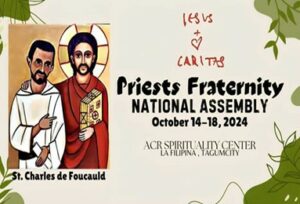 A fter the personal introductions, little sister Cecilia shared with us little sister Cathy’s presentation on “For A Synodal Church of Communion, Participation and Mission: Looking at episodes in the life of Little Brother Charles of Jesus: Shedding light on our Synodal process.” The presentation empowers us to see the rich mutuality between the soul journey of Brother Charles and the synodal processes of a synodal church. We hold the same spirit in the afternoon as we appropriate and share in small groups our review of life in terms of identifying companions and guides in the understanding of our vocation and mission in the church and recalling moments of listening, speaking out, celebrating, discerning and forming. Bishop Edwin in his homily at Mass exhorts us to a level of affective solidarity in their ministry of encountering and befriending the Muslims in Marawi. At the heart of our assembly is a day in the desert. This day of prolonged solitude and intimacy with God is prepared in the evening with a personal vigil at the feet of the Beloved. During our evening Eucharist, we share our desert experiences in the intimacy of the triad. From the day in the desert, we take on the path of looking intently on the essentials of the Spirituality. Both in seeing together and in listening to one another guided by the directory, some emerging concerns surface: that the Month of Nazareth is not anymore a “conditio sine qua non” for members yet it is strongly encouraged; that regularity in the practice of the spiritual means, correspondence with members and attendance to monthly meetings for a year qualifies one to be a regular member; incorporation of the spirituality into the basic ecclesial communities’ practice and spirituality; introduction of the spirituality to the seminaries. We hear concrete realities and practical concerns during the business meeting: that the local fraternities need rekindling and animation through visitation; that the pioneering experiment of doing the Month of Nazareth in Marawi needs further discernment and planning; that the novena to St Charles de Foucauld prepared by the Kapatiran will soon be available; that the next national assembly will be in Palo, Leyte on July 21-25, 2025. Our fraternity night was graced by the presence of Bishop Medel of Tagum.
A fter the personal introductions, little sister Cecilia shared with us little sister Cathy’s presentation on “For A Synodal Church of Communion, Participation and Mission: Looking at episodes in the life of Little Brother Charles of Jesus: Shedding light on our Synodal process.” The presentation empowers us to see the rich mutuality between the soul journey of Brother Charles and the synodal processes of a synodal church. We hold the same spirit in the afternoon as we appropriate and share in small groups our review of life in terms of identifying companions and guides in the understanding of our vocation and mission in the church and recalling moments of listening, speaking out, celebrating, discerning and forming. Bishop Edwin in his homily at Mass exhorts us to a level of affective solidarity in their ministry of encountering and befriending the Muslims in Marawi. At the heart of our assembly is a day in the desert. This day of prolonged solitude and intimacy with God is prepared in the evening with a personal vigil at the feet of the Beloved. During our evening Eucharist, we share our desert experiences in the intimacy of the triad. From the day in the desert, we take on the path of looking intently on the essentials of the Spirituality. Both in seeing together and in listening to one another guided by the directory, some emerging concerns surface: that the Month of Nazareth is not anymore a “conditio sine qua non” for members yet it is strongly encouraged; that regularity in the practice of the spiritual means, correspondence with members and attendance to monthly meetings for a year qualifies one to be a regular member; incorporation of the spirituality into the basic ecclesial communities’ practice and spirituality; introduction of the spirituality to the seminaries. We hear concrete realities and practical concerns during the business meeting: that the local fraternities need rekindling and animation through visitation; that the pioneering experiment of doing the Month of Nazareth in Marawi needs further discernment and planning; that the novena to St Charles de Foucauld prepared by the Kapatiran will soon be available; that the next national assembly will be in Palo, Leyte on July 21-25, 2025. Our fraternity night was graced by the presence of Bishop Medel of Tagum.
“Go on your way; behold I am sending you like lambs among wolves…” was the Gospel exhortation during our final Eucharist. We head home filled with new insights and renewed spirit. “The harvest is abundant but the laborers are few…” We commit to continue the journey with revived sense of co-responsibility and collaboration trusting on the Spirit who is always ahead.
PDF: Lettter from Tagum. Eric LOZADA, international responsible en
(Español) FOUCAULD. Unai QUIRÓS
(Français) Mon Père, je m’abandonne à toi
(Italiano) Piccoli Fratelli di Jesus Caritas, ottobre 2024
Chronicle of the Pan American Team Meeting, September 2024. Carlos Roberto dos SANTOS
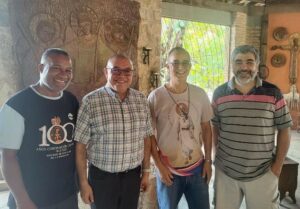 To the brothers of the Jesus Caritas Fraternity
To the brothers of the Jesus Caritas Fraternity
The Pan-American team met in Brazil, in the city of Goiás, between September 16 and 21, 2024. We were at the House of Fraternity these days, where the spirituality of Brothers Charles de Foucauld is lived. Father Carlos Roberto, the Pan-American leader, who lives there, welcomed us and organized the activities of this meeting.
Every day at 7:30 we had a half hour of silent Adoration and at 8:00 we celebrated Lauds. Lunch every day was at 12:30. At 18:30 we had Mass with the community and at 20:00 we had dinner.
On Monday afternoon we had a first meeting simultaneously in person and online. The four members of the team participated: Carlos from Brazil, Mártires from the Dominican Republic, Alex from the USA, Tino from Argentina, Fernando Tapia and Arturo from Chile and Jhonfer from Venezuela. At first, Fr. Tapia told us about the organization of the XII International Assembly (May 6-21, 2025), the Directory and the Statutes of the Fraternity, which the International Team is reviewing. He also informed us about the need to send the registration forms of the leaders and delegates with the respective flights to organize the logistics of the meeting. The invitation letter will be sent from the bishopric of San Isidro for participants who need a visa to enter Argentina.
Then we shared what the fraternities of each of our countries are experiencing and in a special way the formation of the fraternities of other countries such as Venezuela (Fr. Jhonfer was present), Colombia, Cuba, El Salvador, Nicaragua and Panama. On Monday at 6:30 pm we celebrated Mass with the small community that participates in the activities of the House of Fraternity.
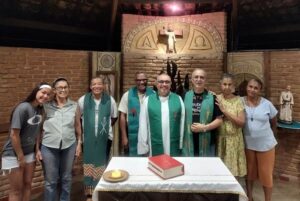 On Tuesday morning we met again online, hoping to receive some enlightenment from Fr. Honoré Sawadogo on the topic: “Fighting clericalism with St. Charles de Foucauld,” but it was not possible because the instability of the internet where he was, did not allow him to connect with us. Therefore, he later sent us the text so that we could have it. In this situation, we continued to share about the life of our fraternities in each country. We experienced a very good exchange of experiences of the existing fraternities and the new ones in formation. Good news is that the Month of Nazareth has been held in several countries of the Americas, and also that there are seminarians and young priests coming and participating in our spirituality.
On Tuesday morning we met again online, hoping to receive some enlightenment from Fr. Honoré Sawadogo on the topic: “Fighting clericalism with St. Charles de Foucauld,” but it was not possible because the instability of the internet where he was, did not allow him to connect with us. Therefore, he later sent us the text so that we could have it. In this situation, we continued to share about the life of our fraternities in each country. We experienced a very good exchange of experiences of the existing fraternities and the new ones in formation. Good news is that the Month of Nazareth has been held in several countries of the Americas, and also that there are seminarians and young priests coming and participating in our spirituality.
On Tuesday afternoon, the organization of the logistics of the IV Pan-American Assembly that will be held in São Paulo, Brazil, continued.
On Wednesday we had Desert Day in the Goiás desert, since it was unbearably hot. We conclude with the celebration of Mass with the People.
On Thursday morning we continued the work on the organization of the IV Assembly. In the afternoon we visited the parish of Our Lady of the Abbey, in the city of Itaberaí, and in the community of San José we went to the homes of some sick people. In the evening we celebrated Mass in the community of San Antonio, together with Father José Mateus Domíngues, who belongs to the Fraternity.
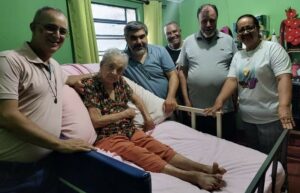 On Friday we spent the morning and afternoon visiting the Paraíso Therapeutic Community, where we shared with the men who live there, who are being helped in their recovery from their chemical dependency. We introduced ourselves, gave our names and where we are from, had lunch with them and ended with the celebration of Mass in the chapel of the Community. During the Mass, each of those present were able to share their pain and suffering, as well as their hopes of achieving a cure and returning healthy to their lives and families. It was a very important moment, which helped us all.
On Friday we spent the morning and afternoon visiting the Paraíso Therapeutic Community, where we shared with the men who live there, who are being helped in their recovery from their chemical dependency. We introduced ourselves, gave our names and where we are from, had lunch with them and ended with the celebration of Mass in the chapel of the Community. During the Mass, each of those present were able to share their pain and suffering, as well as their hopes of achieving a cure and returning healthy to their lives and families. It was a very important moment, which helped us all.
On Saturday morning we discussed the text of the liturgy brochure in various languages, which we will conclude in another meeting. In the afternoon we wrote the text of the invitation for the IV Assembly and finished with the text of the chronicles of this meeting.
On behalf of the Pan American team, a big hug,
Carlos Roberto dos Santos
Continental responsible
Read the document in PDF: Chronicle of the Pan American Team Meeting, September 2024. Carlos Roberto dos SANTOS. en



